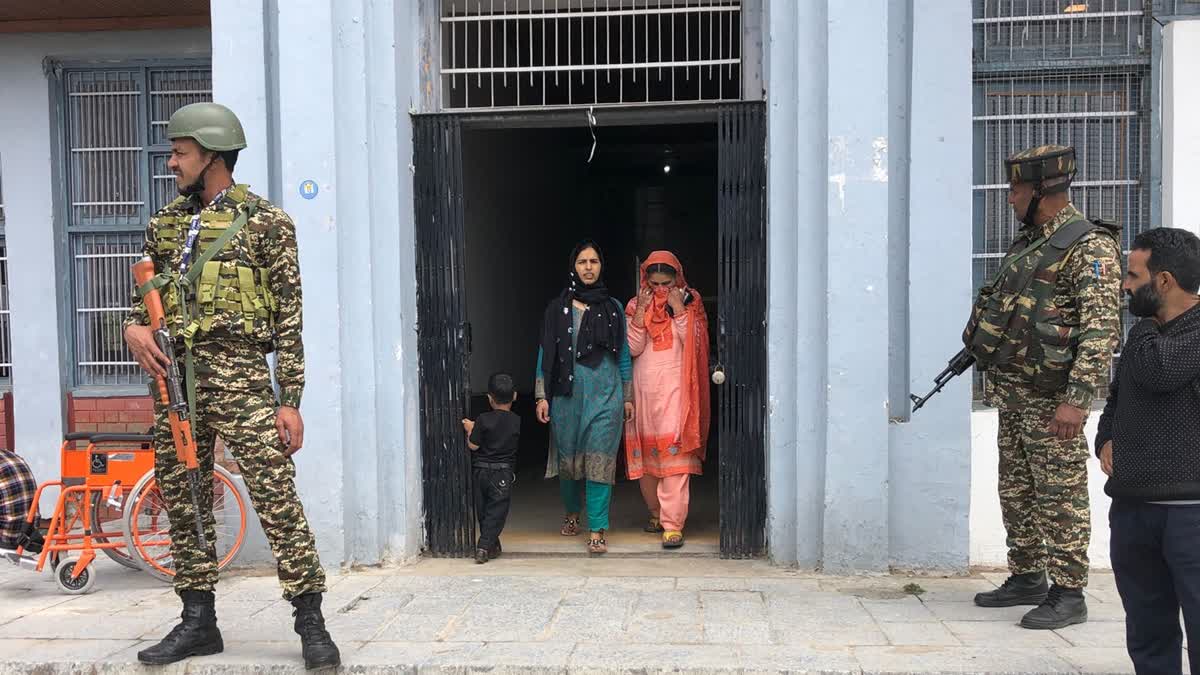Srinagar (Jammu and Kashmir): The conclusion of peaceful parliament elections in Jammu and Kashmir summer capital, Srinagar, with 25 percent turnout in once a boycott-hub, has reinvigorated the electoral exercise after abrogation of Article 370, and may pave way for much-demanded assembly election in Jammu and Kashmir, which is under president's rule after August 5, 2019.
Srinagar parliamentary seat, comprising 18 assembly segments of Pulwama, Srinagar, Ganderbal, Budgam and Shopian, recorded a total turnout of 38 percent, which is around 6 lakh six thousand votes.
This turnout assumes political and electoral significance as in 2019 parliamentary elections Srinagar, Pulwama and Shopian witnessed least turnout since these elections were held in the aftermath of Burhan Wani, the young Hizbul Mujahideen commander's killing and fall of PDP and BJP coalition government. There was violence and poll boycott calls by the separatists, too.
In Monday's elections, Srinagar district recorded 25 percent voting, a major leap from the previous elections and after delimitation, and second highest after 1989 when militancy erupted in Kashmir.
Per parliament election data, in the last five parliament elections, Srinagar had recorded fluctuating turnout, amid boycott calls and militant threats. In 1996, Srinagar recorded 40.94 percent voting rate; in 1998, 30.06 percent; in 1999, 11.93 percent; in 2004, 18.57 percent; in 2009, 25.55 percent; in 2014, 25.86 percent; and in 2019, 14.43 percent.
The highest voter turnout of 73 percent was recorded in Srinagar in 1987. The 1991 elections were not held due to militancy. In 1989, NC won uncontested, when Muhammad Shafi Bhat, late father of BJP leader Hina Shafi Bhat, became MP. in 1980 Farooq Abdullah was elected unopposed.
The districts of Pulwama and one assembly segment of Shopian recorded over 45 percent and 47 percent, respectively, in Monday's elections; a significant upswing than in previous assembly and parliament polls.
Political analysts say that the peaceful parliament elections in Srinagar and Pulwama are a prelude to renewal of the electoral process in Jammu and Kashmir that has set the stage for holding assembly elections.
"The expectation of an early Assembly election soon after the Parliamentary election, has invigorated the electoral environment. The Parliamentary election is seen as a testing ground for political parties for the assembly election," Rehkha Choudhary, former political science professor, said.
Author and political analyst Zaffar Choudhary said that the voter turnout in parliament elections in Srinagar is a win-win situation for Kashmir political parties and the BJP government.
"For parties and people opposed to decommissioning of Article 370 and related developments before and after August 2019, this is a people’s response through vote. For the Government of India and the BJP, a significantly high voting percentage in a violence free election is vindication of their policies, an approval of their approach," he said.
All political parties, after the Supreme Court's final legal stamp on abrogation of article 370, are demanding assembly elections in Jammu and Kashmir. Last assembly elections were held in 2014 when PDP and BJP formed the coalition government, which lasted for just 2 and a half years.
Sources in the Election Commission of India told ETV Bharat that assembly elections in Jammu and Kashmir will more likely be held in September, immediately after the end of Amarnath Yatra. The yatra will commence on 29 June and end by August 19.
The five-judge bench of the Supreme Court that delivered its verdict on abrogation of article 370 had said that the GoI has assured that assembly elections will be held before September 30.



